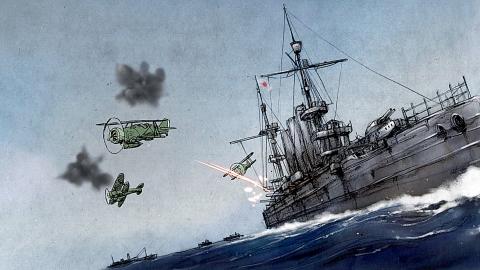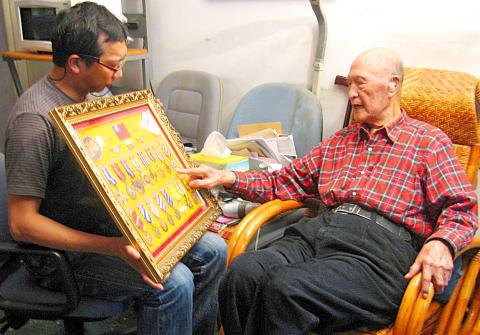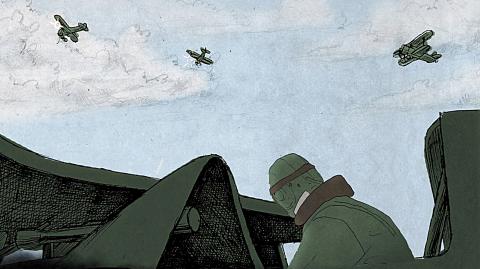Several documentaries made over the past year have examined the legacy of World War II. Song of the Reed (蘆葦之歌), for example, chronicles women who were forced into sexual slavery during the war, while Wansei Back Home (灣生回家) sheds light on the lives of Japanese citizens born in Taiwan during the colonial period from 1895 to 1945.
At first glance, The Rocking Sky appears to be just another version of the first generation of Chinese air force pilots who were trained to fight against imperial Japan’ superior forces.
On closer look, however, director Chang Chao-wei (張釗維) and his crew offer rare insight into the past through interviews with 40 surviving pilots and their relatives in Taiwan, China and Hong Kong. Personal narratives are brought to the forefront through letters, poems, photographs and interviews.

Photo courtesy of CNEX Studio Corporation
The filmmakers emphasize the role of women, revealing the cruelty of war through the eyes of female writers and academics who lived through the period.
While the choice of female writers gives the film a pronounced literary tone, actor Chin Shih-chieh (金士傑) brings further nuance to the film’s emotional core as the off-screen narrator.
The Rocking Sky begins in 1932, just after the Republic of China founded the Central Aviation School in Jianqiao, Hangzhou, in anticipation of an all-out war with Japan. Upon entering the academy, one would see the school’s motto, which reads: “Our bodies, planes and bombs shall perish along with the enemies’ troops, vessels and fortifications.”

Photo courtesy of CNEX Studio Corporation
“No other aviation school in the world would have a motto like this,” the off-screen narrator says.
During the Second Sino-Japanese war, 1,700 Chinese pilots took to the skies, and among them, every six out of 10 gave their lives during the early phase of the war.
The film delves into the lives of celebrated pilots and their heroic deeds.

Photo courtesy of CNEX Studio Corporation
Through the memoir by Chi Pang-yuan (齊邦媛), a prominent Taiwanese author, the struggle of pilot Chang Ta-fei (張大飛) as he faced death on a daily basis quietly emerges. A close friend of Chi’s family, Chang once mentioned to the then young writer that he could never forget the expression of panic on the face of a Japanese pilot he shot down.
After a good friend went on a mission and never returned, Chang wrote to Chi, and said that he knew he would be next.
“I pray and meditate. I feel peace in my heart,” he said.
The pilot was killed during a mission at the age of 26.
By the end of the war, over 4,000 Chinese pilots had perished. Asking what this figure actually means, the film cites a poem by academic Lin Hui-yin (林徽因), who had become a mother figure to eight young pilots, all killed during the war.
Lin’s poem, spoken with real feeling by film director and actress Sylvia Chang (張艾嘉), ends with the following lament:
“You are still just a child but there is nothing that you haven’t given. Millions of people have already forgotten. For whom you have died for?”

Taiwan has next to no political engagement in Myanmar, either with the ruling military junta nor the dozens of armed groups who’ve in the last five years taken over around two-thirds of the nation’s territory in a sprawling, patchwork civil war. But early last month, the leader of one relatively minor Burmese revolutionary faction, General Nerdah Bomya, who is also an alleged war criminal, made a low key visit to Taipei, where he met with a member of President William Lai’s (賴清德) staff, a retired Taiwanese military official and several academics. “I feel like Taiwan is a good example of

March 2 to March 8 Gunfire rang out along the shore of the frontline island of Lieyu (烈嶼) on a foggy afternoon on March 7, 1987. By the time it was over, about 20 unarmed Vietnamese refugees — men, women, elderly and children — were dead. They were hastily buried, followed by decades of silence. Months later, opposition politicians and journalists tried to uncover what had happened, but conflicting accounts only deepened the confusion. One version suggested that government troops had mistakenly killed their own operatives attempting to return home from Vietnam. The military maintained that the

Taipei Mayor Chiang Wan-an (蔣萬安) announced last week a city policy to get businesses to reduce working hours to seven hours per day for employees with children 12 and under at home. The city promised to subsidize 80 percent of the employees’ wage loss. Taipei can do this, since the Celestial Dragon Kingdom (天龍國), as it is sardonically known to the denizens of Taiwan’s less fortunate regions, has an outsize grip on the government budget. Like most subsidies, this will likely have little effect on Taiwan’s catastrophic birth rates, though it may be a relief to the shrinking number of

Since its formation almost 15 years ago, Kaohsiung rock band Elephant Gym (大象體操) has shattered every assumption about contemporary popular music, and their story is now on screen in a documentary titled More Real Than Dreams. It’s an unlikely success story that says a lot about young people in Taiwan — and beyond. For a start, their sound is analog. In the film, guitarist Tell Chang (張凱翔) proudly says: “There is no AI in our sound.” His sister, bass player KT Chang (張凱婷) is the true frontwoman — less for her singing abilities than for her thunderous sound on the instrument. Fast like